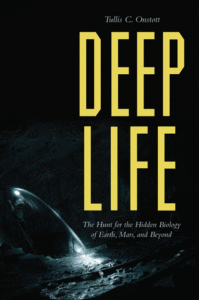 Deep Life is an account of the rise of the field of geobiology from a barely considered pseudoscience in the early 20th century to the keystone of astrobiology it is today. Professor Onstott was there for the majority of this journey, and his perspective on these events gives a fascinating insight into the makings of the field we know today.
Deep Life is an account of the rise of the field of geobiology from a barely considered pseudoscience in the early 20th century to the keystone of astrobiology it is today. Professor Onstott was there for the majority of this journey, and his perspective on these events gives a fascinating insight into the makings of the field we know today.
The first-person perspective is often a blessing, with Onstott’s passion for his subject coming across wonderfully in his writing. On the other hand it can sometimes be limiting, with the adoption of a strict chronological narrative meaning that subjects are sometimes laid aside for pages and even chapters before they are suddenly picked up again in a disjointed manner. While this is an accurate depiction of the scientific process, it can be awkward to read in a book, especially without clear summaries as to where any particular set of experiments was last left. One feels that perhaps the book would benefit from being restructured to focus on specific subjects in one go.
This work is an incredibly detailed look at a scientific career and, while the in-depth descriptions of conferences and planning meetings attended are an accurate depiction of the life of a scientist, perhaps the focus is too much on these subjects to recommend the book to a lay audience. This isn’t helped by the impression that one gets that the author is overestimating the amount of geological knowledge possessed by the general public. This is not a pop-science book about geomicrobiology, and those who come into it expecting a basic introduction to the science will be very disappointed. As a scientific autobiography, both of the author and the field itself, however, it is fascinating reading.
Reviewed by: Peter Woolman, Open University




